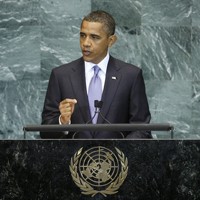President Barack Obama heads to the U.N. tomorrow to address the new session of the General Assembly. His visit will be brief -- he is not even expected to stay for lunch -- and his speech is likely to be sharply worded. In what will probably be his last major international engagement before November’s elections, he has a chance to scold Russia for its behavior over Syria, warn Iran over its nuclear program and reassert America’s primacy on the international stage.
This won’t be an entirely easy exercise for the president in terms of his domestic audience. Whatever he ends up saying, the sizable percentage of the American electorate that instinctively distrusts the U.N. will doubtless find something to dislike. At the same time, those liberals who believe that the president should be boosting international cooperation on issues such as climate change will be disappointed too, as he is not going to make grand promises about his second term that could cause him trouble with voters.
The president will nonetheless be able to point to some notable successes in his administration’s interactions with the U.N. since 2009. Last week, Esther Brimmer, the senior official in the State Department dealing with international organizations, gave a speech in Washington citing examples of how U.S. multilateral leadership has “helped assemble broad coalitions to address crises and avert or stem violent conflict.” They include U.S. collaboration with U.N. peacekeepers in cases such as Haiti and South Sudan.

